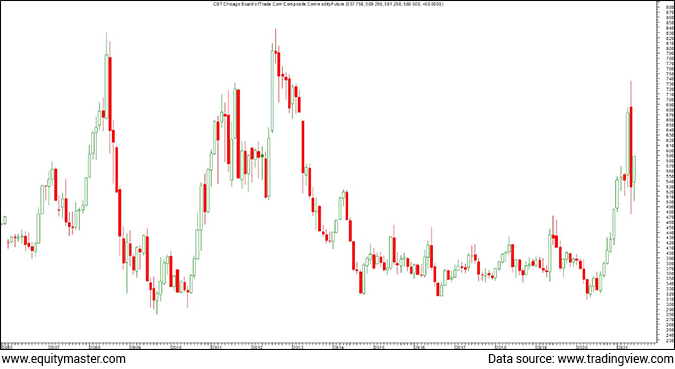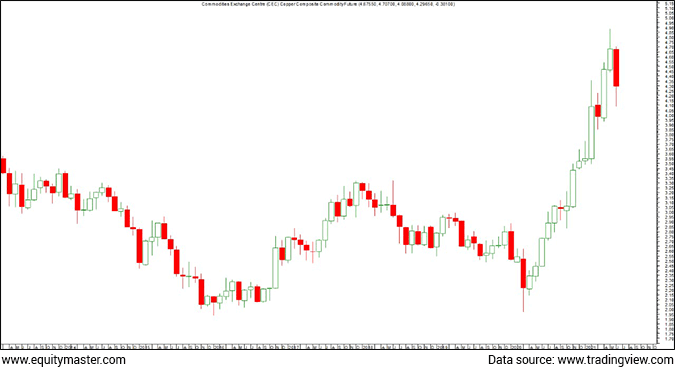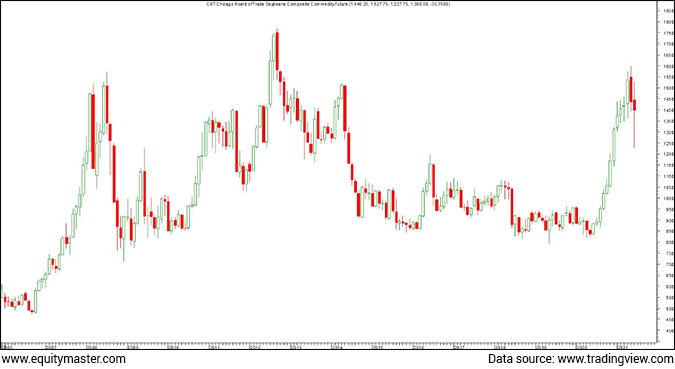Is it Time to Fight the Fed?

There's an old saying on Wall Street: Don't fight the Fed.
It means don't go against big brother. It the government/ central bank wants the market to move in a certain direction, it's unwise to bet against it.
This has certainly been true so far in this bull market.
But are we coming to an end of the easy money policies that made this bull market possible in the first place?
In other words, is it time to start thinking about fighting the Fed?
Find out in the video...
Hello, friends. This is Vijay Bhambwani and I hope you're able to navigate through the traffic of the market a whole lot better when you were before watching my videos and I am able to help you to understand the markets better.
This video is for the serious minded investor and trader. Those who have been participating in the markets for a while, will instantly associate themselves or identify themselves with what I'm saying. Those who have just started out their journey in the financial markets will find it are very interesting learning process.
Now there are some age old cliches or sayings in financial markets and Wall Street, if you may call it that. Now old wisdom on Wall Street says, do not fight the Fed.
Don't Miss: Key Information for Long-term Investors
What it very simply means that don't fight the government treasury. Now Fed just happens to be the US government's Federal Reserve, the treasurer of the government.
But in India, you can call it the Reserve Bank of India, which is the banker to the government. In UK, it is the Bank of England. In the European Union, it is the European Central Bank, the ECB.
So the age old saying is, don't fight the Fed, which means don't fight the government treasury for the simple reason that they can print currency, which is called fiat currency printing. They print unbacked currency and flood it in the market and thereby create a flow of liquidity in the market, which pushes the markets higher.
Now this is something that the governments realised and effectively used it to excellent use, especially after 9/11 when those two airliners crashed into the World Trade Centre towers in America in 2001.
The US Federal Reserve went into a state of overdrive, printed a lot of currency, cut interest rates and stimulated the economy.
Of course, there will be course corrections because this is like inflating balloon with air. You can make it bigger, but you always run the risk of overfilling the balloon with air, and therefore it is bound to deflate or even explored sometimes.
That happened in 2008 in what we now call the global financial crisis. The Fed again went into overdrive, printed a lot of currency, and it inflated another a market rally.
Then came the covid pandemic and the steep decline in March 2020, something that a lot of my viewers will be aware about.
Now you can instantly relate to the March 2020 decline because chances are you probably were there, and the rally that ensued thereafter is something that you would have probably participated in.
Now old timers, veteran traders, often debate among themselves when they've seen these cycles in the past, as to whether it is time to fight the Fed or basically go against the direction of the US Federal Reserve.
Like I said, these terms are interchangeable. You can call it the European Central Bank. You can call it the Bank of England. You can call it the Reserve Bank. So basically, should you fight the market rally, which is induced by liquidity, pump priming the economy and, by extension, the financial markets?
So we are basically trying to discuss whether it is time to take a cautious note about the effects of the pump priming of the economy by artificial injections of easy money that started almost immediately after the pandemic in induced lockdowns in March 2020.
Now to kind of fortify my points, I want to show you a couple of charts and the first one coming up on your screen is corn.

Now when easy money is printed, almost everything goes up because money finds refuge in places where prices can appreciate and therefore, this money can earn return on investment or what is simply known as a profit.
Initially, stock markets went up, and then, after 6 to 8 months' time lag, you saw a whole lot of buying coming in into commodities and now you're hearing about super cycles and base metals. You're hearing about a sustainable long-term rally in crude oil and natural gas.
Whether I agree with it or not is beside the point. We are basically saying that this is what you're hearing. Unfortunately for us, this rally has also trickled down into agricultural commodities and, like I've mentioned in my other videos, the Food and Agricultural Organisation, which is a subsidiary of the United Nations, has said food prices are at almost decade highs, depending on what category of food.
So the corn chart that you're seeing on your screen shows that corn hit the highest after December 2012 and has fallen 20% from the peak it made recently on the monthly chart as you can see.
Take the second a chart, which is copper. Now here is what you're hearing about a supercycle in industrial metals or what is known as base metals.

Copper is at a new high in this chart, in this chart's period, but it has retraced 15% from its recent highs. Now that's something which is fairly noticeable. Just because the chart a monthly chart. it basically doesn't strike us much but ask a trader who was holding long positions from the peak and he will tell you how much of mark to market payments that have to be borne by the trader.
The third one is soya beans. Now this is again a very liquid counter in the United States, and the United States is a big exporter of soya beans.

Now, this commodity also hit a new high after September 2012. Now that remember is a nine year peak, and now it has fallen very sharply.
I talked of another commodity, lumber, which is wood, lakdi. Wood was a six bagger in the year 2020 and in the early parts of 2021. It has fallen more than 44% from its peak. Do remember that the Dow Theory says any tradable security, whether it's a commodity, an index, or currency, whatever, if it falls more than 20% from its recent peak, it is supposed to be in a bear market.
So if you see many of these commodities not necessarily listed on the MCX have actually surrendered 20%, almost 20% or even more than 20% from their peaks. This is the markets way of saying that, hey, the period of easy money may not be over right now but it may be coming to an end.
Cheap and easy money is like mother's milk to a bull market. Why my saying mother's milk? It's because a new born baby multiplies in body weight while it is still only on mother's milk so easy money is the fuel that powers any bull market.
Now, if the cost of money, which is interest rate, is about to go up, the market senses danger and it starts to take corrective action.
Smart money tends to pull money out of riskier assets like equities, and it is the retail trader who takes the market up towards the fag end of the rally.
If you global search you will see that most of the big shot investors or very high profile investors or even corporate promoters are bailing out of stocks.
People like Jeff Bezos, Warren Buffett, Bill Gates, etcetera, etcetera are known to have basically offloaded quite a lot of their holdings. You can basically get details from the Securities and Exchange Commission's websites, etcetera. All this data is very easily assemble from the worldwide domain, the worldwide web.
So when smart money is bailing out and I have also shared in my recent charts, retail traders and the markets in a recent video, which was titled Retail Traders and the Markets, I have shown you how it is the retail segment, which is basically pulling the markets higher by the virtue of their long positions, which is more than six times higher than DIIs and FIIs together.
So I am not saying that you need to go up there and sell all your holdings. I am not saying that the US Federal Reserve or even the RBI is going to raise interest rates tomorrow morning. I am not saying that it's almost or immediate time to fight the Fed.
But I think that time may be coming around the corner and this is something that smart investors would like to, and definitely should prepare for in advance.
Whether it will come in the end of 2021 or it will come in the mid of 2022, we don't know. Just like you, I will await the official announcement from official sources.
But this is something that can happen. Don't get lulled into a belief that good times or the present times rather, good or bad, the present times will last forever. Nothing lasts forever. The era of cheap money or even negative interest rates is unlikely to be a permanent feature. When it comes, be prepared.
On this optimistic note, I bid goodbye to you in this video not before reminding you to subscribe to my YouTube channel if you haven't already done so. Click on the bell icon to receive instant alerts about fresh videos being put up out here. Good, bad or ugly, I welcome all your comments. So please keep them coming and help me reach out to fellow like-minded investors and traders by referring my video to your family and friends.
I wish you have a very, very profitable day and a good week ahead. Thank you for your patience, watching my videos, and till we meet again in my next, this is Vijay Bhambwani signing off for now.
Take good care of your health, your trades, your investments, friends, and families. Bye bye for now.
Warm regards,

Vijay L Bhambwani
Editor, Fast Profits Daily
Equitymaster Agora Research Private Limited (Research Analyst
Recent Articles
- Pyramiding PSU Bank Stocks September 22, 2023
- How to trade PSU banking stocks now.
- 5 Smallcap Stocks to Add to Your Watchlist Right Now September 12, 2023
- These smallcaps are looking good on the charts. Track them closely.
- Vodafone Idea - Can Idea Change Your Life? September 6, 2023
- What is the right way to trade Vodafone Idea?
- Repro Books Ltd: The Next Multibagger Penny Stock? August 28, 2023
- Is this the next big multibagger penny stock? Find out...
Equitymaster requests your view! Post a comment on "Is it Time to Fight the Fed?". Click here!
2 Responses to "Is it Time to Fight the Fed?"


usha badrinarayanan
Jul 3, 2021Not easy to understand for ordinary investors like me.